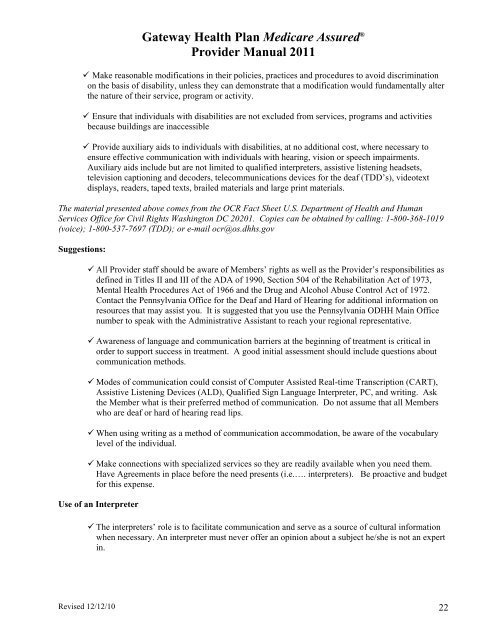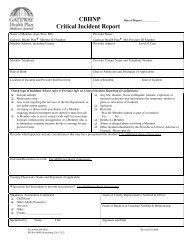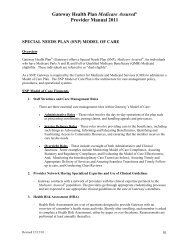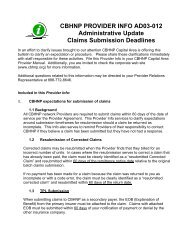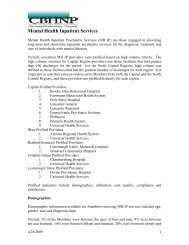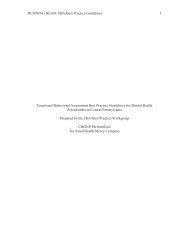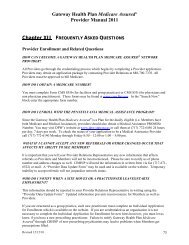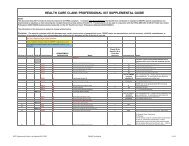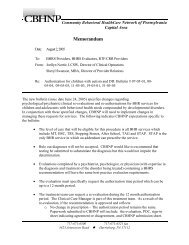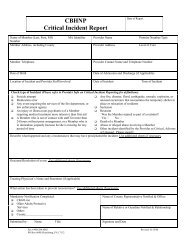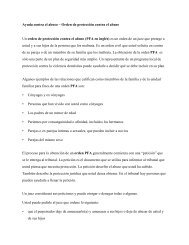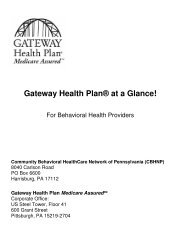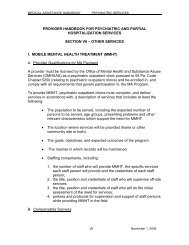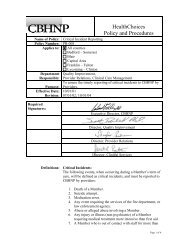GATEWAY Health Plan Medicare Assured® Provider ... - CBHNP
GATEWAY Health Plan Medicare Assured® Provider ... - CBHNP
GATEWAY Health Plan Medicare Assured® Provider ... - CBHNP
Create successful ePaper yourself
Turn your PDF publications into a flip-book with our unique Google optimized e-Paper software.
Gateway <strong>Health</strong> <strong>Plan</strong> <strong>Medicare</strong> Assured ®<br />
<strong>Provider</strong> Manual 2011<br />
Make reasonable modifications in their policies, practices and procedures to avoid discrimination<br />
on the basis of disability, unless they can demonstrate that a modification would fundamentally alter<br />
the nature of their service, program or activity.<br />
Ensure that individuals with disabilities are not excluded from services, programs and activities<br />
because buildings are inaccessible<br />
Provide auxiliary aids to individuals with disabilities, at no additional cost, where necessary to<br />
ensure effective communication with individuals with hearing, vision or speech impairments.<br />
Auxiliary aids include but are not limited to qualified interpreters, assistive listening headsets,<br />
television captioning and decoders, telecommunications devices for the deaf (TDD’s), videotext<br />
displays, readers, taped texts, brailed materials and large print materials.<br />
The material presented above comes from the OCR Fact Sheet U.S. Department of <strong>Health</strong> and Human<br />
Services Office for Civil Rights Washington DC 20201. Copies can be obtained by calling: 1-800-368-1019<br />
(voice); 1-800-537-7697 (TDD); or e-mail ocr@os.dhhs.gov<br />
Suggestions:<br />
All <strong>Provider</strong> staff should be aware of Members’ rights as well as the <strong>Provider</strong>’s responsibilities as<br />
defined in Titles II and III of the ADA of 1990, Section 504 of the Rehabilitation Act of 1973,<br />
Mental <strong>Health</strong> Procedures Act of 1966 and the Drug and Alcohol Abuse Control Act of 1972.<br />
Contact the Pennsylvania Office for the Deaf and Hard of Hearing for additional information on<br />
resources that may assist you. It is suggested that you use the Pennsylvania ODHH Main Office<br />
number to speak with the Administrative Assistant to reach your regional representative.<br />
Awareness of language and communication barriers at the beginning of treatment is critical in<br />
order to support success in treatment. A good initial assessment should include questions about<br />
communication methods.<br />
Modes of communication could consist of Computer Assisted Real-time Transcription (CART),<br />
Assistive Listening Devices (ALD), Qualified Sign Language Interpreter, PC, and writing. Ask<br />
the Member what is their preferred method of communication. Do not assume that all Members<br />
who are deaf or hard of hearing read lips.<br />
When using writing as a method of communication accommodation, be aware of the vocabulary<br />
level of the individual.<br />
Make connections with specialized services so they are readily available when you need them.<br />
Have Agreements in place before the need presents (i.e.…. interpreters). Be proactive and budget<br />
for this expense.<br />
Use of an Interpreter<br />
The interpreters’ role is to facilitate communication and serve as a source of cultural information<br />
when necessary. An interpreter must never offer an opinion about a subject he/she is not an expert<br />
in.<br />
Revised 12/12/10 22


